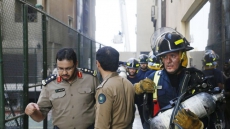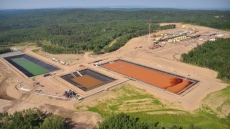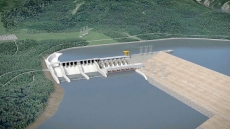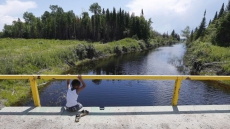OTTAWA — Key dates in the Maher Arar ordeal:
Sept. 26, 2002: Arar arrives at JFK Airport in New York City, on a flight from Zurich, headed for Montreal. Detained by U.S. authorities, questioned, told he is inadmissible to the United States and asked where he would like to go. He says Canada.
Oct. 4, 2002: Arar visited by Maureen Girvan, Canadian consular officer in New York. She later says she never thought the Americans would send him anywhere except home to Canada.
Oct. 8, 2002: Arar taken from his cell at 3 a.m., told by American officials he is being deported to Syria on suspicion of terrorist activity. Bundled aboard private jet.
Oct. 9, 2002: Plane lands in Jordan, Arar quickly transferred by car to Damascus where he is to be jailed by Syrian military intelligence.
Oct. 10, 2002: Arar gets first look at cell he describes as size of a grave. Spends most of next 10 months there.
Oct. 11, 2002: Arar tortured for first time, beaten on palms, wrists, lower back and hips with electrical cable. Makes false confession to terrorist training in Afghanistan.
Oct. 23, 2002: Arar meets Canadian consul Leo Martel for first time. Beatings have lessened since he was first jailed, and Martel later says he couldn’t detect any signs of physical torture. Several more consular visits in subsequent months but none is private; Syrian officials insist on being present.
Early April, 2003: Arar briefly allowed some time in outdoor courtyard. First time he has seen sun in six months.
April 23, 2003: Arar meets Canadian ambassador Franco Pillarella and two visiting Canadian MPs, Marlene Catterall and Sarkis Assadourian. Again Syrians insist on being present and he can’t speak frankly.
Aug. 14, 2003: Routine consular visits resume after long interruption. Arar describes living conditions and later says he told consul he had been tortured. Consul says he knew living conditions were bad, but Arar never spoke of torture.
Aug. 23, 2003: Arar blindfolded, put in car and driven to new prison. Treatment improves and there is no further torture. No longer held in solitary confinement, can mix with other prisoners.
Sept. 19, 2003: Arar teaching English to fellow prisoners when he hears another Canadian has arrived at prison. It’s Abdullah Almalki, an acquaintance from Ottawa who has also been tortured.
Oct. 4, 2003: After days expecting further interrogation, Arar told instead he will be going home to Canada. He doesn't believe it.
Oct. 5, 2003: Arar taken to meet prosecutor who reads out confession of his supposed terrorist past and tells him to sign it without giving him chance to read it. Then taken to meet head of Syrian military intelligence, who has been joined by Canadian officials for occasion. Arar freed and put on plane to Canada.
Sept. 18, 2006: Inquiry report blames RCMP for supplying inaccurate information to Americans about Arar's alleged terrorist leanings, likely basis for the U.S. decision to detain and deport. Says Arar has committed no crime and is no threat to Canadian security.
Sept. 28, 2006: RCMP Commissioner Giuliano Zaccardelli apologizes to Arar, but says he will not resign. Receives support from government and some opposition parties.
Dec. 6, 2006: Zaccardelli resigns after acknowledging he provided erroneous information about the Arar case to a Commons committee.
Dec. 12, 2006: Second part of Arar inquiry report released, recommending much tougher oversight of RCMP and other security agencies.
Jan. 26, 2007: Canadian government gives Arar apology, $10.5-million settlement and another $1 million in legal costs.
May 2008: RCMP closes its long-running investigation into damaging leaks about Arar without laying charges.
Oct. 21, 2008: Report by former Supreme Court judge Frank Iacobucci finds Canadian officials were partly to blame for the brutalization of Almalki and two other Arab-Canadians, Ahmad El Maati and Muayyed Nureddin, by sharing information — including unsubstantiated allegations — with foreign security agencies. Iacobucci concludes the three men were tortured in Syrian custody and, in the case of El Maati, in Egypt as well.
June 14, 2010: U.S. Supreme Court declines to hear Arar's legal case against American government.
Sept. 1, 2015: RCMP charges former Syrian military intelligence officer George Salloum with Arar's torture.




